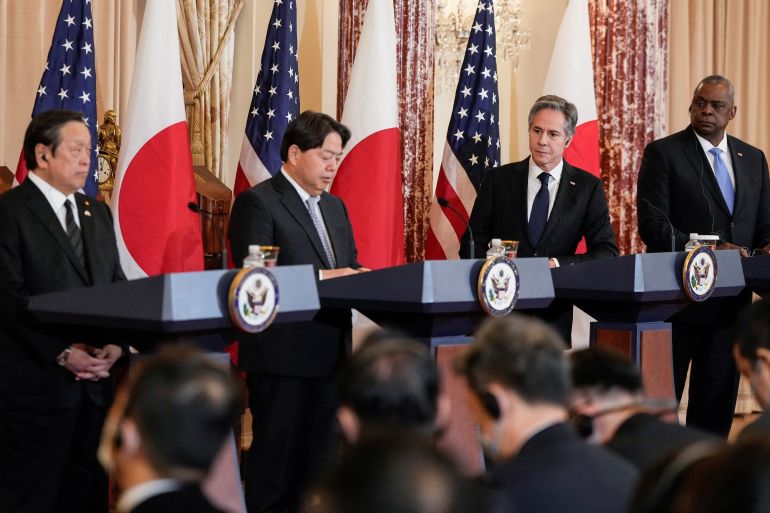Japan eases curbs on weapons exports, raises defence budget to record $56bn
Pacifist nation’s major overhaul to arms restrictions in a decade comes amid rising security tensions in Indo-Pacific.

Japan has loosened its arms exports restrictions to allow it to send domestically produced missiles and artillery to countries that include the United States as the cabinet approved a record increase in defence spending for next year amid widening security risks in the Indo-Pacific region.
The most significant policy overhaul in nearly a decade was announced on Friday and will enable Japan to ship Patriot air defence missiles to the US.
Keep reading
list of 3 itemsJapan sanctions individuals, company over links to Hamas
Japan expands sanctions over Russia’s war in Ukraine
The new measures still prevent Japan from shipping weapons to countries that are at war, but the move will help the US supply Ukraine with additional military aid in its war against Russia.
“This holds significant meaning in terms of further strengthening the Japan-US alliance. It will contribute not only to Japan’s security but also the peace and stability of the wider Indo-Pacific region,” Chief Cabinet Secretary Yoshimasa Hayashi said.
On Friday, the cabinet also approved a record increase in defence spending by more than 16 percent in 2024, which will accelerate the deployment of long-range cruise missiles that can hit targets in China and North Korea.
The 7.95-trillion-yen ($56bn) budget for the financial year starting in March is in line with Prime Minister Fumio Kishida’s goal of doubling defence spending to the NATO standard of 2 percent of gross domestic product by 2027 and falls under the new security strategy the government adopted a year ago.
Japan wants to dramatically expand its defence capacity because it has been alarmed by China’s expanding military ambitions while Russia’s invasion of Ukraine has also stoked fears that China may move to take over Taiwan, a self-governed democracy claimed by Beijing.
North Korea’s missile launches and the likelihood of future nuclear tests have also pushed Tokyo to boost its defence spending.
The announcements on Friday marked a major shift for Japan, which has long adopted a stance of not allowing exports of deadly weapons, and the reinforcement of its strike capability is a break from its post-World War II principle of limiting use of force to self-defence.
The Patriot missile defence system is one of an array of weapons supplied by the West to Ukraine. Japan produces Patriot missiles under licence from US firms Raytheon and Lockheed Martin.
Under previous rules, Japan could export only components of arms and was prohibited from delivering completed products.
The revised guidelines will now allow Tokyo to export completed products to countries where patent holders are based. Any re-exports to third countries would require permission from Tokyo.
The ruling party has been mulling changes to the export controls for months because the rules could stand in the way of shipping next-generation fighter jets in development with Britain and Italy.
The Financial Times reported that Japan is also considering exporting 155mm artillery shells manufactured under a licence from BAE Systems to the United Kingdom.